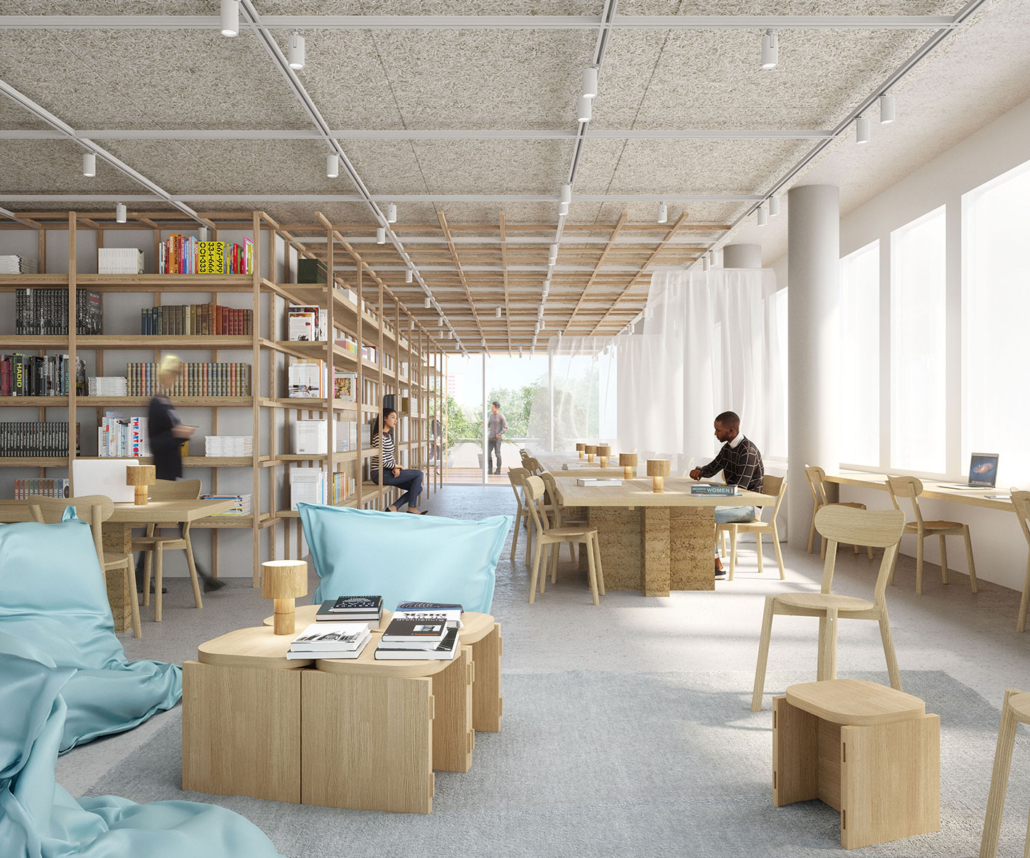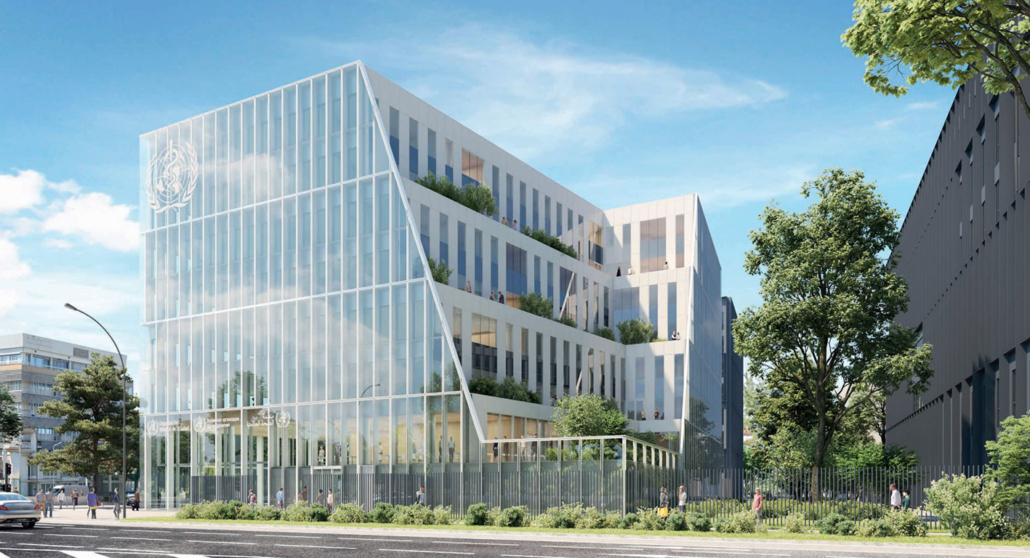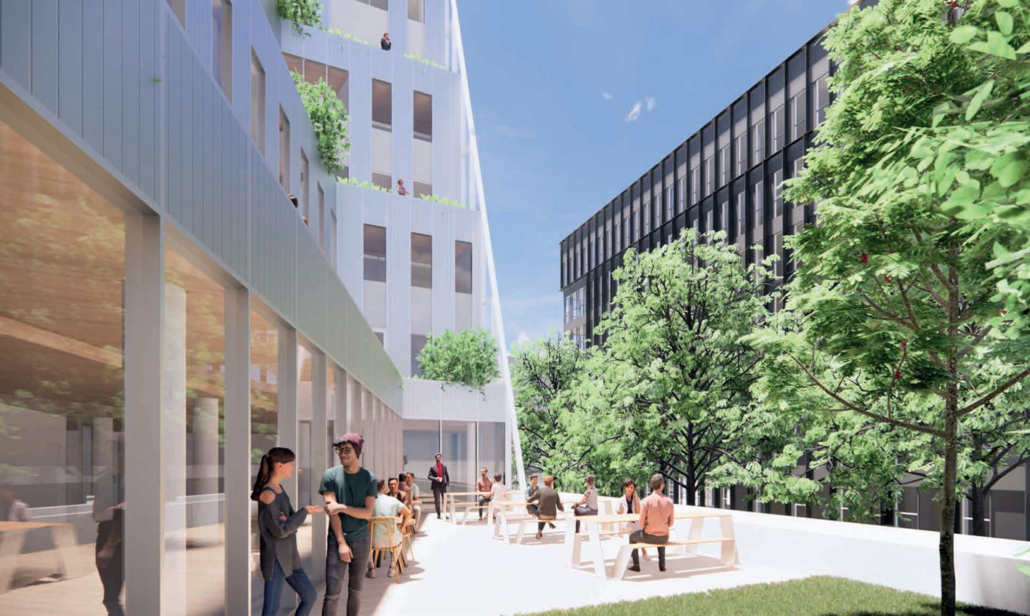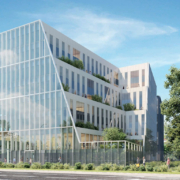Macron, Ghebreyesus break ground for new WHO Academy in Lyon

A 3D rendering of the Library at the WHO Academy in Lyon, France. © ateliers 2/3/4/
French president Emmanuel Macron, and WHO Director-General Dr Tedros Adhanom Ghebreyesus, today broke ground for the WHO Academy’s campus in the French city of Lyon.
The event fulfils a commitment by the two leaders to establish a WHO Academy in Lyon’s bio-medical district to meet the needs of WHO Member States and a growing global health workforce to provide for expanded access to life-long learning, health guidance and competency-building.
Designed for collaborative learning
When it opens in 2024, the WHO Academy campus in Lyon will have high-tech and people-centred spaces designed for collaborative learning, educational research and innovation. It will also host a world-class health emergencies simulation centre that will use advanced technologies to enable health workers to sharpen their competencies amid realistic scenarios including mass casualties and disease outbreaks.

A 3D rendering of the exterior of the WHO Academy in Lyon, France. © ateliers 2/3/4/
During today’s event at Lyon’s Cité Internationale, President Macron and Dr Tedros reviewed an architectural model of the building and talked via video-link with health workers who have participated in the Academy’s Mass Casualty Management programme, which is already operating in several countries including France, Greece, Afghanistan, Ethiopia and Somalia.
The quickening pace of scientific discovery and advancement of technology is making it more difficult for health workers, policy makers and other public health practitioners to keep up with evidence-based health practice and policy. As a result, it often takes more than a decade to put important life-saving guidelines into practice.
From its campus in Lyon, the Academy will offer multilingual, personalized learning programmes in digital, in-person and blended formats, deploying the latest evidence-based health guidance, state-of-the-art learning technologies and advancements in the science of adult learning.
Resilience during a health crisis
“The ambitions of the WHO Academy are not modest: to transform lifelong learning in health globally,” said Dr Tedros. “The COVID-19 pandemic is a powerful demonstration of the value of health workers, and why they need the most up-to-date information, competencies and tools to keep their communities healthy and safe.”
He added: “The WHO Academy is an investment in health, education, knowledge and technology, but ultimately it’s an investment in people, and in a healthier, safer, fairer future.”
“The quality of the health workforce is the key to resilience during a health crisis,” said President Macron. “Investing in health systems is the best way to prepare for future pandemics. Success requires unprecedented coordination of all actors. WHO is, of course, a key player and its Academy will be an essential platform for disseminating learning.”

A 3D rendering of the exterior of the WHO Academy in Lyon, France. © ateliers 2/3/4/
The Academy aims to expand access to critical learning to health workers, managers, public health officials, educators, researchers, policy makers and people who provide care in their own homes and communities, as well as to WHO’s own workforce throughout the world. The vast majority will use online means to access the Academy’s programmes, which will be made available via desktop and mobile devices and in low-bandwidth settings, thereby ensuring an equitable, global and diverse cohort of learners.
Additionally, the WHO Academy will:
- Harness the capabilities of new, high-impact technologies such as virtual reality, augmented reality, artificial intelligence and serious educational games to deliver health learning for maximum impact.
- Formally recognize the competencies gained by learners through “digital credentials” that they can show to employers and regulatory agencies to help advance their careers.
- Offer more than 100 major learning programmes by 2023, with flagship credentialed programmes for COVID-19 Vaccine Equity, Universal Health Coverage, Health Emergencies and Healthier Lives. The Academy will also offer its learners streamlined access to WHO’s full breadth of hundreds of e-learning programmes currently spread over 20 digital learning platforms as well as access to high quality learning programmes developed by others.
WHO Academy’s Executive Director
WHO also used the occasion to announce the appointment, which became effective on 16 August 2021, of Dr Agnès Buzyn as the Academy’s Executive Director. She has been serving since January as the WHO Director-General’s Envoy for Multilateral Affairs, during which time she has also supervised the Academy project.
Lead investor
As a WHO Member State and a key actor in global health, France is the lead investor in the Academy’s development, having committed more than €120 million to support its establishment and infrastructure. This achievement is possible thanks to the collective actions, commitment and financial support of the City of Lyon and the Lyon Metropole, as well as from the Auvergne-Rhône-Alpes region, which contributed €25 million of the total investment. The region will own the campus and lease it to WHO.

 ateliers 2/3/4/
ateliers 2/3/4/